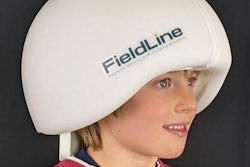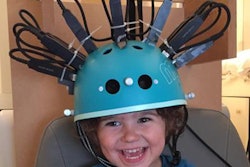Researchers in the U.K. have developed a lightweight magnetoencephalography (MEG) prototype helmet designed to measure brain activity as people make natural movements, according to a study published online on 21 March in Nature.
The goal of the five-year, Wellcome-funded project, based at the University of Nottingham and University College London, is to advance research and treatment for patients such as young children with epilepsy or patients with neurodegenerative disorders who cannot undergo imaging by traditional fixed MEG scanners.
MEG is designed to map brain function by measuring the magnetic fields. The millisecond-by-millisecond images show which parts of the brain are engaged when people perform different tasks, such as speaking or moving.
This scanner features lightweight sensors mounted in a 3D-printed prototype that can be placed directly onto the scalp surface. By positioning the sensors closer to the brain, the researchers can increase the amount of signal and collect more data.
The researchers currently are working to design the helmet to more of a bicyclist style, which would be suitable for infants, children, and adults.


.fFmgij6Hin.png?auto=compress%2Cformat&fit=crop&h=100&q=70&w=100)





.fFmgij6Hin.png?auto=compress%2Cformat&fit=crop&h=167&q=70&w=250)











